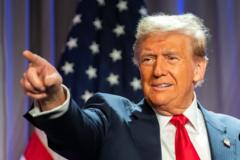In a bold declaration on social media, Donald Trump has threatened to impose a staggering 100% tariff on BRICS nations if they attempt to communicate a new rival currency, amidst rising tensions regarding the U.S. dollar’s global foothold.
Trump Issues Stark Warning of 100% Tariff on BRICS Nations Over Dollar Replacement

Trump Issues Stark Warning of 100% Tariff on BRICS Nations Over Dollar Replacement
President-elect signals tough stance on currency challenges to U.S. dollar dominance.
In the lead-up to his inauguration, President-elect Donald Trump has issued a stern warning against the BRICS alliance, which comprises emerging economies including Brazil, Russia, India, China, South Africa, Iran, Egypt, Ethiopia, and the United Arab Emirates. On Saturday, Trump took to social media to express that any efforts by these nations to develop a rival currency to the U.S. dollar would be met with severe economic consequences. "The notion that BRICS countries can shift away from the Dollar while we sit idle is OVER," he stated.
His comments come as key leaders from Brazil and Russia have indicated interest in establishing a BRICS currency to diminish the dollar's predominance in international trade. However, progress toward that goal has been hindered by internal disputes within the bloc. “A commitment from these countries is required; failing which, they will face 100% tariffs and should be prepared to lose access to the prosperous U.S. market,” Trump declared on his platform, Truth Social. He added, “They can find another sucker to do business with.”
Some Trump associates believe these statements are part of a broader negotiation strategy, intended to set a tough initial stance rather than a definite promise. Republican Senator Ted Cruz underscored the tactic's potential effectiveness, highlighting past cases where tariff threats yielded positive outcomes.
Meanwhile, as Trump prepares for his presidency, Canadian Prime Minister Justin Trudeau made an unexpected visit to Mar-a-Lago in Florida, indicating the urgency surrounding potential tariffs that could impact Canadian imports. Trump's Treasury Secretary nominee, Scott Bessent, suggested that the president-elect's confrontational tariff rhetoric is designed to yield negotiations: "It's escalate to de-escalate," he remarked.
Tariffs, which impose a domestic tax on imports, form a cornerstone of Trump’s economic agenda, reflecting his belief that they can boost the U.S. economy while safeguarding jobs. However, most economists caution that such taxes often result in higher prices for American consumers rather than costs to foreign exporters.
The potential for escalating trade tensions signals a contentious road ahead for international economic relations and raises questions about the sustainability of the U.S. dollar's dominant global position. The ongoing discourse surrounding these tariffs and their implications will be closely monitored as Trump enters his presidency and engages with both allies and adversaries on the world stage.





















